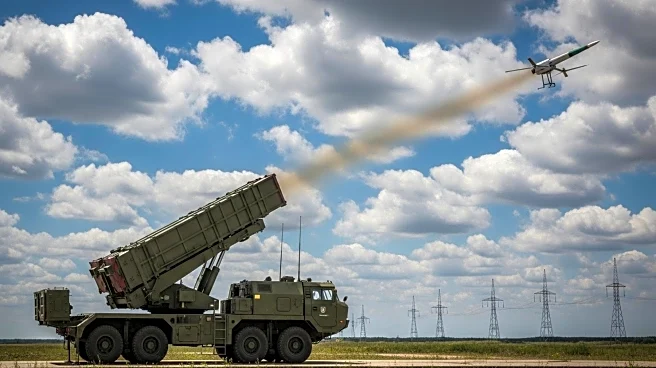What's Happening?
The Ukrainian Air Force reported a significant defensive success, downing 303 drones, 12 Iskander-K cruise missiles, and five Kh-59/69 guided air missiles launched by Russian forces. These attacks primarily targeted critical energy infrastructure in Kharkiv and other regions, including Poltava, Sumy, Dnipropetrovsk, Odesa, and Kyiv oblasts. The strikes are part of a broader Russian strategy to undermine Ukraine's energy capabilities as the winter season approaches. Ukrainian President Volodymyr Zelensky had previously warned of Russia's focus on energy infrastructure to disrupt Ukraine's winter preparations. The Ukrainian Ministry of Energy and Naftogaz reported significant damage to energy facilities, highlighting the civilian impact of these military actions.
Why It's Important?
The attacks on Ukraine's energy infrastructure have profound implications for the country's ability to sustain its population during the winter months. By targeting non-military energy facilities, Russia aims to weaken Ukraine's resilience and potentially create humanitarian challenges. This strategy could lead to increased pressure on Ukraine's government and military, as they must allocate resources to protect and repair critical infrastructure. The broader geopolitical impact includes heightened tensions between Russia and European nations, as Russia's actions are perceived as part of a hybrid warfare campaign to destabilize Europe. The situation underscores the importance of international support for Ukraine, both in terms of military aid and humanitarian assistance.
What's Next?
Ukraine is likely to continue strengthening its air defense systems, particularly the Patriot systems, to counter the evolving Russian missile and drone tactics. The international community may increase its support for Ukraine, providing advanced defense technologies and humanitarian aid to mitigate the impact of infrastructure attacks. Additionally, diplomatic efforts to address the conflict and its broader implications for European security may intensify. The ongoing conflict could lead to further sanctions against Russia, aimed at curbing its military capabilities and economic resources.
Beyond the Headlines
The ethical implications of targeting civilian infrastructure in warfare are significant, raising questions about the adherence to international laws and conventions. The attacks on energy facilities highlight the vulnerability of civilian infrastructure in modern conflicts, prompting discussions on the need for enhanced protection measures. Long-term, the conflict may drive innovations in defense technologies, particularly in drone and missile interception capabilities. The situation also reflects the broader geopolitical struggle between Russia and Western nations, with potential shifts in alliances and international policies.










